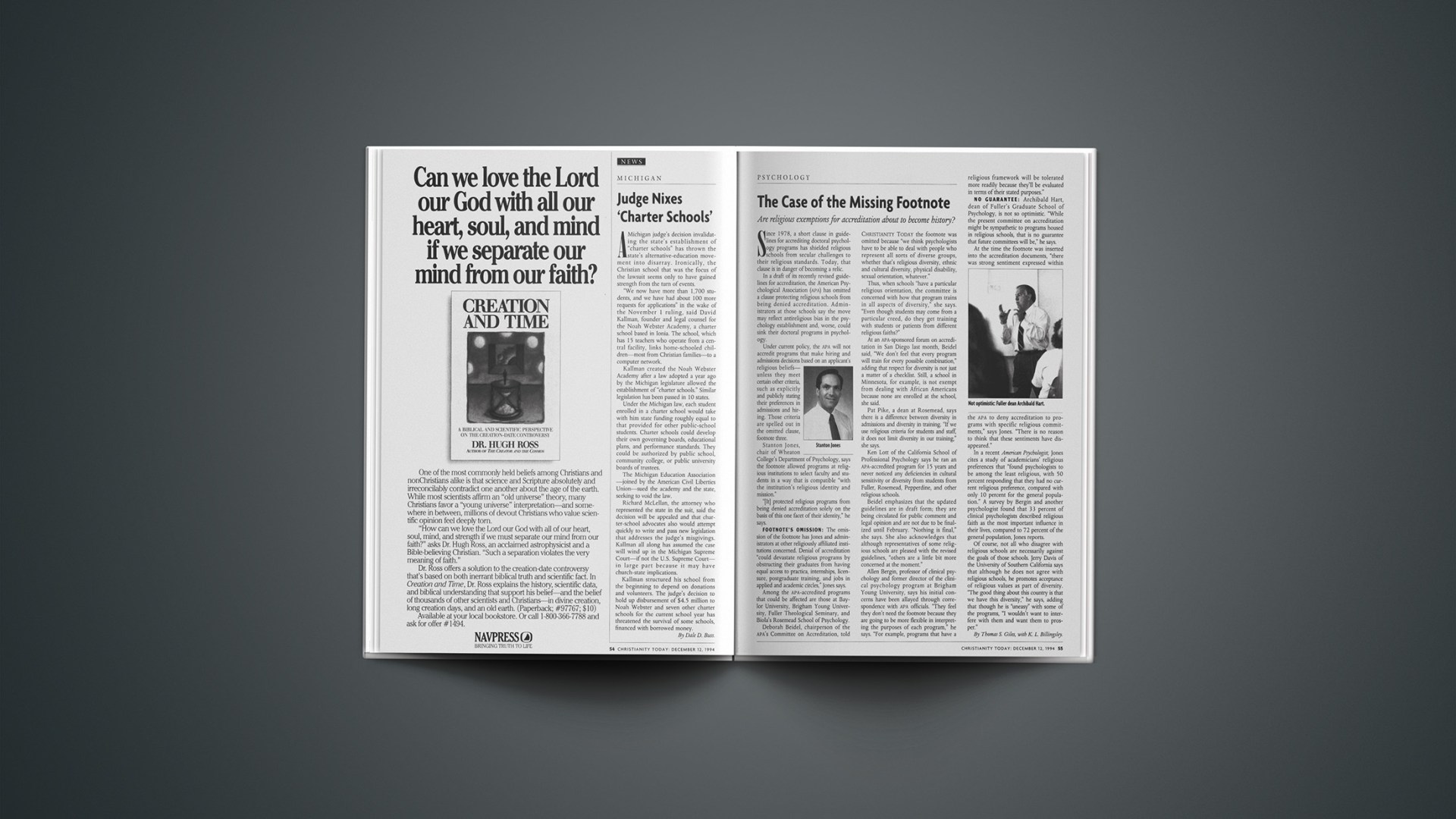Since 1978, a short clause in guidelines for accrediting doctoral psychology programs has shielded religious schools from secular challenges to their religious standards. Today, that clause is in danger of becoming a relic.
In a draft of its recently revised guidelines for accreditation, the American Psychological Association (APA) has omitted a clause protecting religious schools from being denied accreditation. Administrators at those schools say the move may reflect antireligious bias in the psychology establishment and, worse, could sink their doctoral programs in psychology.
Under current policy, the APA will not accredit programs that make hiring and admissions decisions based on an applicant’s religious beliefs – unless they meet certain other criteria, such as explicitly and publicly stating their preferences in admissions and hiring. Those criteria are spelled out in the omitted clause, footnote three.
Stanton Jones, chair of Wheaton College’s Department of Psychology, says the footnote allowed programs at religious institutions to select faculty and students in a way that is compatible “with the institution’s religious identity and mission.”
“[It] protected religious programs from being denied accreditation solely on the basis of this one facet of their identity,” he says.
FOOTNOTE’S OMISSION
The omission of the footnote has Jones and administrators at other religiously affiliated institutions concerned. Denial of accreditation “could devastate religious programs by obstructing their graduates from having equal access to practica, internships, licensure, postgraduate training, and jobs in applied and academic circles,” Jones says.
Among the APA-accredited programs that could be affected are those at Baylor University, Brigham Young University, Fuller Theological Seminary, and Biola’s Rosemead School of Psychology.
Deborah Beidel, chairperson of the APA’s Committee on Accreditation, told Christianity Today the footnote was omitted because “we think psychologists have to be able to deal with people who represent all sorts of diverse groups, whether that’s religious diversity, ethnic and cultural diversity, physical disability, sexual orientation, whatever.”
Thus, when schools “have a particular religious orientation, the committee is concerned with how that program trains in all aspects of diversity,” she says. “Even though students may come from a particular creed, do they get training with students or patients from different religious faiths?”
At an APA-sponsored forum on accreditation in San Diego last month, Beidel said, “We don’t feel that every program will train for every possible combination,” adding that respect for diversity is not just a matter of a checklist. Still, a school in Minnesota, for example, is not exempt from dealing with African Americans because none are enrolled at the school, she said.
Pat Pike, a dean at Rosemead, says there is a difference between diversity in admissions and diversity in training. “If we use religious criteria for students and staff, it does not limit diversity in our training,” she says.
Ken Lott of the California School of Professional Psychology says he ran an APA-accredited program for 15 years and never noticed any deficiencies in cultural sensitivity or diversity from students from Fuller, Rosemead, Pepperdine, and other religious schools.
Beidel emphasizes that the updated guidelines are in draft form; they are being circulated for public comment and legal opinion and are not due to be finalized until February. “Nothing is final,” she says. She also acknowledges that although representatives of some religious schools are pleased with the revised guidelines, “others are a little bit more concerned at the moment.”
Allen Bergin, professor of clinical psychology and former director of the clinical psychology program at Brigham Young University, says his initial concerns have been allayed through correspondence with APA officials. “They feel they don’t need the footnote because they are going to be more flexible in interpreting the purposes of each program,” he says. “For example, programs that have a religious framework will be tolerated more readily because they’ll be evaluated in terms of their stated purposes.”
NO GUARANTEE
Archibald Hart, dean of Fuller’s Graduate School of Psychology, is not so optimistic. “While the present committee on accreditation might be sympathetic to programs housed in religious schools, that is no guarantee that future committees will be,” he says.
At the time the footnote was inserted into the accreditation documents, “there was strong sentiment expressed within the APA to deny accreditation to programs with specific religious commitments,” says Jones. “There is no reason to think that these sentiments have disappeared.”
In a recent American Psychologist, Jones cites a study of academicians’ religious preferences that “found psychologists to be among the least religious, with 50 percent responding that they had no current religious preference, compared with only 10 percent for the general population.” A survey by Bergin and another psychologist found that 33 percent of clinical psychologists described religious faith as the most important influence in their lives, compared to 72 percent of the general population, Jones reports.
Of course, not all who disagree with religious schools are necessarily against the goals of those schools. Jerry Davis of the University of Southern California says that although he does not agree with religious schools, he promotes acceptance of religious values as part of diversity. “The good thing about this country is that we have this diversity,” he says, adding that though he is “uneasy” with some of the programs, “I wouldn’t want to interfere with them and want them to prosper.”
Copyright © 1994 Christianity Today. Click for reprint information.










